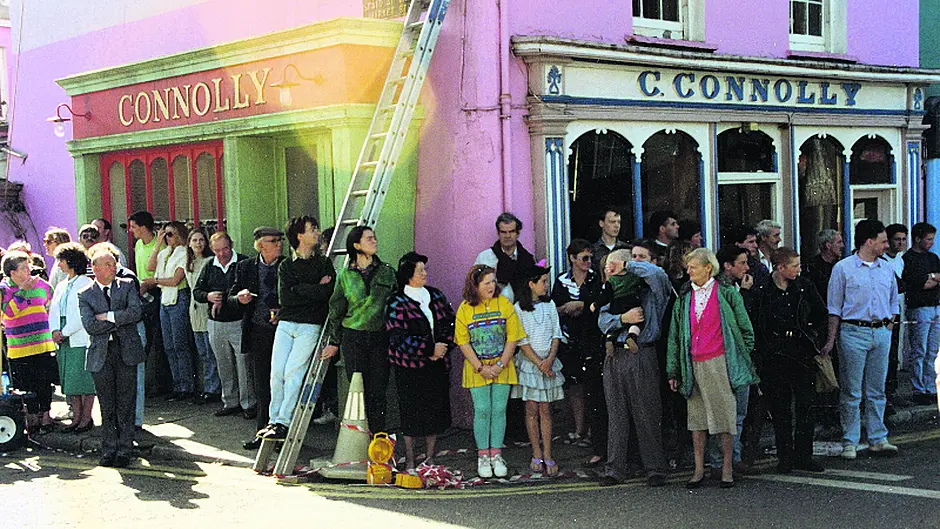As War of the Buttons celebrates 21 years since its release this week, Kieran O’Mahony talks to some of the cast and crew and their memories of a very special summer in West Cork, in 1993
THIS war wasn’t going to take long. In fact, it had to be over by dinner time.
At least that is what the publicity posters for the War of the Buttons said.
Released 21 years ago this week, the movie took much longer than a day to shoot, in various locations around West Cork, when ‘Hollywood’ came to Castletownshend, Rosscarbery, Union Hall and Skibbereen.
It was the summer of 1993 and for many locals living here, it was their first glimpse of filmmaking.
For one day’s filming in Skibbereen, old shopfronts were re-painted, fake ones were installed, streetscapes were transformed, yet despite all the hard work, locals remember that most of those shots remained on the ‘cutting room floor’, as they say.
But to this day, there are still a few pieces of memorabilia to be found in homes around West Cork – from props, to posters, to signed cast sheets, and more than a few buttons, we suspect.
But almost everyone in West Cork has a memory of the time the ‘big movie’ came to the area.
It was boom-time in Skibbereen – the unofficial HQ of the set – with restaurants, B&Bs and pubs all benefitting from the influx of cast and crew.
Some locals got roles as carpenters, drivers, caterers or extras, while others got their first taste of movie-making, leading to a career in film and television.
As well as the big-name actors like Liam Cunningham, Colm Meaney and Ger Ryan, the cast was made up of children from all over the county.
The plot, based on two rival gangs on young kids, seemed hand-made for young amateurs to get their start in the seemingly glamorous industry.
Cork-born Jonathan Rhys Myers, then just 16, auditioned for the role of Fergus, with Gregg Fitzgerald eventually winning out to play him on screen. The added bonus, of course, was that the producer, David Puttnam, had a great track record, with the award-winning Chariots of Fire already under his belt.
Based on a 1912 French novel, La Guerre des Boutons, the film was directed by John Roberts and followed the trials of two rival gangs of youths in the fictional villages of Ballydowse and Carrickdowse. From their numerous battles, the winners got to cut the buttons from the clothes of their rivals.
For Danny Crowley from Leap working on the set was a dream come true. Since then he has carved out a successful career in sound mixing and currently works on one of the world’s biggest television shows – Game of Thrones.
As a 17-year-old Leaving Cert student, Danny applied for a trainee role in sound the minute he heard they would be filming in West Cork.
‘They had already employed a guy for the job, but luckily I got to join them three weeks into the shoot,’ recalls Danny. ‘They organised it for me to get two weeks’ work experience unpaid, but they kept me on for three months after, in a paid position.’
As a film fanatic, it was an incredible experience for the young man. ‘I was gob-smacked to see how it all worked and I would still say it’s the pinnacle of my career to date. We had a lot of fun shooting the film and there was a great crew and I also got to meet David Puttnam too.’
Such was his passion for film that Danny missed the start of the school year in favour of staying with the filming.
‘I was hooked from that job onwards, and went on to study Film and Fine Arts in university in England. I actually got a job working on the ill-fated Divine Rapture that was shot in Ballycotton, and we were shooting for two weeks before it collapsed, due to lack of funding. But I continued to get more work after that and never went back to college.’
Danny always remembers the gift of a still of WOTB that he received from director John Roberts, when they finished shooting.
‘That was great to get. Also, going to the premiere of the film in Cork with the whole cast and crew was amazing – to see my name in the credits! The experience certainly opened up a whole career to me,’ he says.
Working on Puttnam’s movie was also Adrian McCarthy’s first experience of working on a film set, and the Skibbereen native is now a successful producer and director with Wild Fire Films who produced the rugby documentary, Hidden Impact shown on RTE earlier this week.
‘I was 25-years-old when I worked on it and I was in my second year of a TV Production course in Dublin when I heard that David Puttnam was making a film in West Cork,’ says Adrian, ‘so I knocked on a few doors to try and get on the crew.’
‘Working in film was never on my radar until my early 20s, but once I got the taste for it, there was no going back and to get the opportunity to work with David Puttnam, who was behind such massive films as Midnight Express, The Mission and Chariots of Fire was unbelievable.’
Adrian worked as a trainee assistant director and was put in charge of crowd casting which involved organising the extras, which he recalls fondly, as he knew so many of them personally.
‘As it was my first feature film, I knew nothing when I started and had to learn the ropes pretty quickly. There were lots of highs and a few lows. It was hard work at times, but I also have great memories of balancing time with the crew and time with friends and family, as so many of them were extras and on set. The main crew on set were made up of some of the best in the business and the standards were really high and I do think that has stood to me since.’
Getting a part in the movie was the last thing Gerard Kearney was expecting when he went along with a group of friends to an audition in Cork. Originally from St Lukes in the city, but now living in Douglas, Gerard – an established magician – didn’t even know it was for a feature film when he found himself getting called back a few more times.
‘It was only at the fifth callback that I was told that it was for a film and I couldn’t believe it,’ recalls Gerard. ‘I got to meet the director and producer of the film. At the last audition they were casting for the two main leads but I didn’t get either, and I thought that was it. However, two weeks later the casting people rang me and asked me to come down to West Cork to play a character called Chick.’
‘We had rehearsals for about two weeks and then they decided to give me a bigger role as ‘Big Con’ who was Fergus’s right-hand man. I remember Jonathan Rhys Meyers was also there for the rehearsals, but he didn’t land either of the main roles. We were put up in an old school house and we had chaperones, too, to look after us.’
‘I had the time of my life and it was certainly an eye opener,’ he says now. ‘It was the first time ever that I had someone depending on me. I decided to run with it, but I looked forward to it every day.’
The friendships he made during the shooting of the film have stood the test of time and he is still great friends with Paul Batt, who played ‘Gorilla’ – they were both groomsmen at each other’s weddings.
The acting bug didn’t leave Gerard, either, and 12 years later he got a part in Ken Loach’s The Wind that Shakes the Barley.
However, these days he’s more comfortable turning his hand to entertaining of a different kind.
Yvonne McNamara from Skibbereen still has the original jacket she wore as ‘Maeve’ in the film and it’s something she treasures to this day. As a 12-year-old girl, Yvonne had no acting experience but she found herself going from being an extra in the film to suddenly playing one of the principal parts in the film.
‘I started off with a no speaking part and the directors then gave me the role of Maeve which was amazing as I was getting paid more. But it was hard work, too, as we were on set seven days a week and the hours were long,’ said Yvonne, who now owns Essential Beauty in Skibbereen.
‘Looking back now I probably didn’t appreciate the enormity of it all then, but it certainly was a brilliant experience and when we finished filming we got a lovely framed letter of appreciation from David Puttnam. I also remember going to the premiere of it in Cork and it was only then that it hit me when I saw it up on the big screen there. It was a great experience to be part of something so special in West Cork.’








